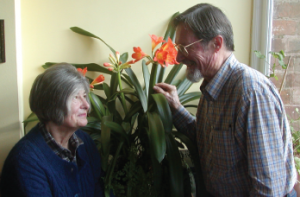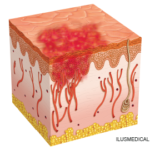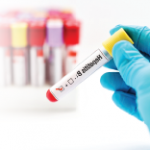
Dr. Bacon and his wife, Jean.
Paul A. Bacon, MD, professor emeritus of the University of Birmingham’s Department of Rheumatology, died on Jan. 5, 2018. The news of his passing saddened those who had the good fortune to know and collaborate with him. He was admired for his indefatigable dedication to measurement in rheumatic disease, especially vasculitis, as well as to collaborations across disciplines and to new ventures.
Upon hearing the news, Philip Seo, MD, director of The Johns Hopkins Vasculitis Center, associate professor of medicine at Johns Hopkins and the physician editor of The Rheumatologist, commented, “Paul Bacon was responsible for creating many of the early measurement instruments in lupus and vasculitis. In clinical trials of vasculitis in particular, the challenge is always how to prove that one intervention is better than another. Paul Bacon basically invented the yardstick.”
In 2010, The Rheumatologist ran a profile on Dr. Bacon. He told us that choosing medicine meant that he became “the black sheep of the family,” because he broke with family tradition to do so. Both his grandfather and father were actuaries. Encouraged by “an extremely good biology master” at his Quaker school, the young Dr. Bacon sat for the Cambridge entrance exams, was accepted, and then did his clinical studies at the “ancient” hospital of St. Bartholomew, founded in 1123.
From 1965 to 1968, Dr. Bacon was a research fellow/registrar at the newly established Kennedy Institute of Rheumatology in London. He received an Arthritis Research Campaign (ARC) Copeman Traveling Fellowship to spend a year with Carl Pearson, MD’s rheumatology group at the University of California, Los Angeles (UCLA). He then returned to England to become a consultant rheumatologist at the Royal National Hospital for Rheumatic Diseases in Bath.
Some of Dr. Bacon’s career highlights:
1966–Research fellow and registrar at Kennedy Institute of Rheumatology;
1969–Senior registrar at St. Bartholomew’s Hospital;
1971–Research fellow in rheumatology at UCLA;
1972–Consultant rheumatologist at Royal National Hospital for Rheumatic Diseases in Bath and Southmead Hospital in Bristol;
1981–ARC chair and head of rheumatology at the University of Birmingham;
1988–Sabbatical year at the NIH; and
2001–Professor of rheumatology at the University of Birmingham.
By 1981, he had established himself as a leading immunology researcher. Dr. Bacon’s career was marked by many accomplishments—among them, founding the world-leading Department of Rheumatology at the University of Birmingham, said Professor David Adams, pro-vice chancellor and head of College of Medical and Dental Sciences at the University of Birmingham.
“Following his retirement, Paul continued to make outstanding contributions to vasculitis research as an emeritus professor, working particularly closely with colleagues in India,” said Professor Adams.
“Paul was indeed a remarkable man,” reflected Professor Rohini Handa, MD, senior consultant rheumatologist, Apollo Indraprastha Hospitals, New Delhi, India, and past president of the Indian Rheumatology Association. In an email, Dr. Handa elaborated, “Paul was constantly at it. He was a true friend of Indian rheumatology and Indian rheumatologists. The moving spirit behind our vasculitis group (IRAVAS), he would not take ‘no’ for an answer. With innumerable visits to India and countless emails, differences were sorted out, academic issues prioritized, posters presented and collaborations revitalized. Indian rheumatology cherishes his lasting legacy—the Indian Takayasu clinical activity score (ITAS).”
“How to describe him?” mused Loïc Guillevin, MD, MACR, and emeritus professor of medicine at the Hôpital Cochin at the Université Paris Descartes, France, when asked about his colleague and friend. “He was, certainly, an inspiration when it came to the field of vasculitis.” Dr. Guillevin noted that Dr. Bacon is, in his mind, “the father of the BVAS [Birmingham Vasculitis Activity Score],” developed in collaboration with Raashid Luqmani, MD, professor of rheumatology at the University of Oxford, and other colleagues. “It was really his idea to have some criteria to follow patients and evaluate them over time.”
Dr. Guillevin shared Dr. Bacon’s interests and invited him to present at the Université Paris Descartes. “In a meeting,” Dr. Guillevin recalled, “he was a fantastic chairman, because he was able to stimulate discussion. Of course, he was a leader in the field of vasculitis. But not only that, he needed to stimulate questions to foster clinical researchers, and he really was very good [at that].”
He was also known for his mentorship, Professor Adams added. “In addition to his major research contributions in the area of immunology and vasculitis, Paul was a remarkable mentor, having trained most of the UK’s professors of rheumatology by the time of his retirement in 2003.
“Many of us owe Paul a huge debt. His successors to the ARUK chair of rheumatology, Professors Chris Buckley and Karim Raza, are organizing a memorial service for Paul later in the year where we can show our appreciation of his remarkable contributions to the University.”
Gretchen Henkel is a health and medical journalist based in California.

